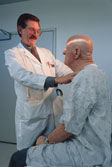 
Dawn
of a New Machine
(continued)
Turteltaub
and Karen Dingley, a senior biomedical scientist at Lawrence Livermore,
are using the AMS to answer important questions about colon cancer.
About 95,000 Americans are diagnosed with the disease each year.
While its causes remain largely unknown, dietary factors appear
to be a leading culprit — and PhIP, a compound that is present
in well-done, grilled or barbecued meat, is a top suspect.
In one of the first human experiments involving the new machine,
Dingley created gelatin capsules filled with the same amount of
PhIP that you would find in a large, very well-done chicken breast.
So that it could be measured, the PhIP was first tagged with carbon-14.
For Dingley’s experiment, five volunteers, all recently diagnosed
with colon cancer, were asked to swallow a gelatin capsule a few
days before they were scheduled to undergo cancer surgery. Several
samples of the patients’ blood were taken over the next 24
hours. After their surgery, samples of tissue that weren’t
needed for tumor diagnosis or staging were also collected.
Then Dingley fed the samples into the AMS. The compound was detected
in blood and colon tissue samples up to 72 hours after the volunteers
swallowed the capsules.
Furthermore, when Dingley extracted DNA from the samples, she found
that PhIP had insinuated itself into the cells’ genetic code,
causing obvious genetic damage — the type of damage that leads
to cancer.
Although carbon-14 is radioactive, the groundbreaking experiment
posed no danger to the human volunteers. Only an infinitesimal amount
of carbon-14 was needed — less than one percent of the radiation
we typically absorb from normal background sources in the environment
in an entire year.
  

Home |
Table of Contents |
To our Readers |
Building on Basics
Focusing on Patients |
In Translation |
First Steps
Campus Connection |
Benefactors |
News in Brief
UC Davis Health System |
© 2000, 2001, 2002 UC Regents. All rights reserved.
|
 |



 

David
Gandara, above with patient, believes the AMS may allow doctors
to tailor chemotherapy to each patient's individual metabolism and
disease.
|


